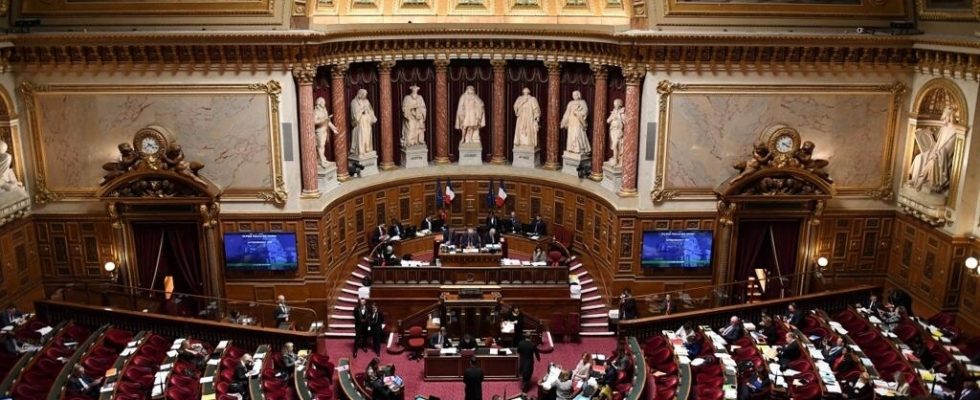The results of the senatorial elections confirmed on Sunday the stability of the Upper House, dominated by the right, and the difficulties of the Macronists, in an election marked by the return of the National Rally to the Luxembourg Palace.
5 mins
No surprises at the Luxembourg Palace. The second hemicycle of Parliament keeps the same political color on the evening of the senatorial elections. Eight months before the next major European electoral meeting, 170 of the 348 senatorial seats were to be filled for six years in around forty departments, from Landes to Pas-de-Calais via Paris, Île-de-Calais, France or Mayotte. The other 178 will be in 2026. Around half of the Senate is renewable every three years during an indirect vote – by 162,000 large voters, municipal councilors at 95% –, which still struggles to excite the crowds.
Verdict: the right retains a solid majority. The Les Républicains party aims “ 143 or 144 senators », compared to 145 previously. In the allied group of the centrist Union, Hervé Marseille, re-elected in Hauts-de-Seine, hopes “ enrich » his troops and “ reach sixty members “. The Socialist Party (PS) intends to remain the second group in the Senate (currently 64 senators), in a hemicycle still attached to the traditional left-right divide. These results reflect the municipal elections where the right achieved good scores in medium-sized cities.
“ This senatorial renewal reinforces the senatorial majority of the right and the center », rejoiced Gérard Larcher (LR), re-elected at the age of 74 for a sixth term in Yvelines, before a more than likely reappointment to his position as President of the Senate on October 2. “ The Senate will continue to be this essential counter-power to democracy “, he added. For his part, the head of the LR group Bruno Retailleau castigated after this indirect ballot a “ new failure of the President of the Republic » in the Senate, due to the “ disconnection of macronism with the field “.
Renaissance in decline
The Renaissance party candidates paid for their weak local roots, with a series of setbacks. From Sunday morning, they recorded an emblematic defeat, that of the Secretary of State for Citizenship Sonia Backès, the only minister in the running, beaten in the second round in New Caledonia by the separatist Robert Xowie. Could this defeat lead her to leave the government, a rule hitherto applied by the President of the Republic for his ministers in the legislative elections? Neither the Élysée nor Matignon responded to AFP on this subject on Sunday.
François Patriat, president of the Renaissance group in the Senate, puts things into perspective and speaks of an expected setback: “ We were alone against everyone. We managed to save most of the group today. » Among its executives in the Senate, Renaissance saved the seat of Xavier Iacovelli (Hauts-de-Seine), but not that of Julien Bargeton in Paris nor Alain Richard (Val-d’Oise). The Macronists united within the RDPI group (24 elected officials) risk seeing their troops decline. Like Louis Vogel, elected in Seine-et-Marne, Édouard Philippe’s Horizons party seems more dashing.
On the left, the elected representatives of Paris in force
The socialists are doing well. “ Symbolically, it is important », recognizes their leader Patrick Kanner – re-elected in the North –, satisfied to have signed “ a win-win agreement » with communists and ecologists in around fifteen departments. “ I had set myself, with my communist and green colleagues, the bar of 100 senators (of the left), I believe that we will be familiar with it “, he said. The bet was won in the capital where this gathering sent eight of the twelve Parisian senators to the Luxembourg Palace, while the divided right obtained four seats.
The former environmentalist presidential candidate Yannick Jadot thus entered the Senate, just like the communist Ian Brossat. This result marks “ a historic victory for environmentalists in Paris », Launched the elected environmentalist to AFP, who sees in it the “ rise of environmentalists in this territory “. “ I am going to be in the Senate to both carry the entire ecological project, on immigration, on decentralization, on proportional representation, but to ensure that France is up to the ecological challenge. »
Yannick Jadot should join a slightly strengthened green group, in particular by Mathilde Ollivier, elected senator for French people abroad, at only 29 years old, and who thus becomes the youngest in the Senate. “ It’s important for my generation, the climate generation too, to be represented in institutions “, she reacted to AFP.
Three seats for the far right
The communist group should also progress slightly. This left-wing alliance did not please rebellious France, dismissed for lack of sufficient local coverage to fill the ranks of the Senate.
Finally, the National Rally, absent from the Senate since the departure of Stéphane Ravier at Reconquête, is making its return to the upper house. The far-right party announced it would obtain three seats: Christopher Szczurek in Pas-de-Calais, Joshua Hochart in the North and Aymeric Durox in Seine-et-Marne. “ It’s a very big questioning, a kind of big wave that moves forward constantly », Reacted the socialist Patrick Kanner.
Several figures have left their place, such as the communists Eliane Assassi and Pierre Laurent, the senator (LR) of Meuse Gérard Longuet or the socialists Jean-Pierre Sueur and David Assouline.
Having returned to the forefront of the media scene in recent months with notable commissions of inquiry (McKinsey Affair, Marianne Fund, etc.), the upper house likes to emphasize the seriousness of its debates in the face of the tumult of the Assembly.
(With AFP)
